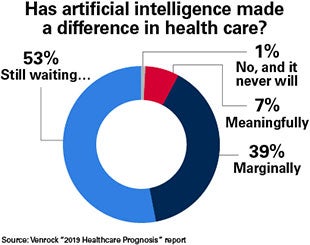

How AI Will Impact Care Delivery in 2020

What’s New?
Sixty faculty members from Partners HealthCare — the Boston-based system that has been at the forefront of exploring artificial intelligence — recently identified 12 emerging AI technologies with the greatest potential to impact health care as soon as next year.
The team identified its “Disruptive Dozen” AI technologies at the World Medical Innovation Forum. Speakers focused on how AI will impact diagnosis and treatment over the coming year, citing such areas as AI’s potential to identify individuals at risk of domestic violence, to predict suicide risk and to narrow the gaps in behavioral health care.
Applying AI in Behavioral Health Care
David Ahern, PhD, a clinical psychologist at Brigham & Women’s Hospital, told Health IT Analytics that AI’s potential for addressing gaps in behavioral health care, in particular, are “enormous.” And while providers and patients need to be wary of commercial applications that haven’t been rigorously validated and tested, the report notes that researchers increasingly are developing AI-based tools with the backing of randomized trials and are showing good results.
 Promising innovation is occurring in the integration of rigorously validated behavioral health methods into smartphone apps. One such AI app under development is targeted for patients with opioid, alcohol and other forms of substance use with co-occurring mental illness. The app provides patients with a virtual form of integrated group therapy, a highly effective treatment that teaches behaviors and skills to manage, recover and prevent relapse.
Promising innovation is occurring in the integration of rigorously validated behavioral health methods into smartphone apps. One such AI app under development is targeted for patients with opioid, alcohol and other forms of substance use with co-occurring mental illness. The app provides patients with a virtual form of integrated group therapy, a highly effective treatment that teaches behaviors and skills to manage, recover and prevent relapse.
AI also is proving powerful in identifying patients at risk of suicide based on electronic health records data and examining social media content with the goal of detecting early warning signs of suicide — the 10th leading cause of death in the U.S. and the second leading cause of death among young people. While these technologies are under development and not cleared for clinical use, the Partners team says these efforts toward an early warning system could alert physicians, behavioral health professionals and family members when a loved one in their care needs help.
Spotting Hidden Signs of Partner Violence
Using data-driven tools, researchers are developing AI-enabled tools that can alert clinicians if a patient’s injuries likely stem from intimate partner violence (IPV). While screening for IPV can help detect and prevent future violence, less than 30 percent of IPV cases seen in the emergency department are appropriately flagged as abuse-related. The Partners team believes AI tools will further complement the provider’s role as a trusted source for divulging abuse.
Whether large numbers of hospitals and health systems will be ready in the near future to evaluate and deploy AI in these or other types of clinical or business situations remains to be seen. Many remain skeptical. They question whether AI will have real application in monitoring patients for serious health conditions. More than half the health IT professionals responding to a recent survey conducted by the venture capital firm Venrock said they are still waiting to adopt AI.



